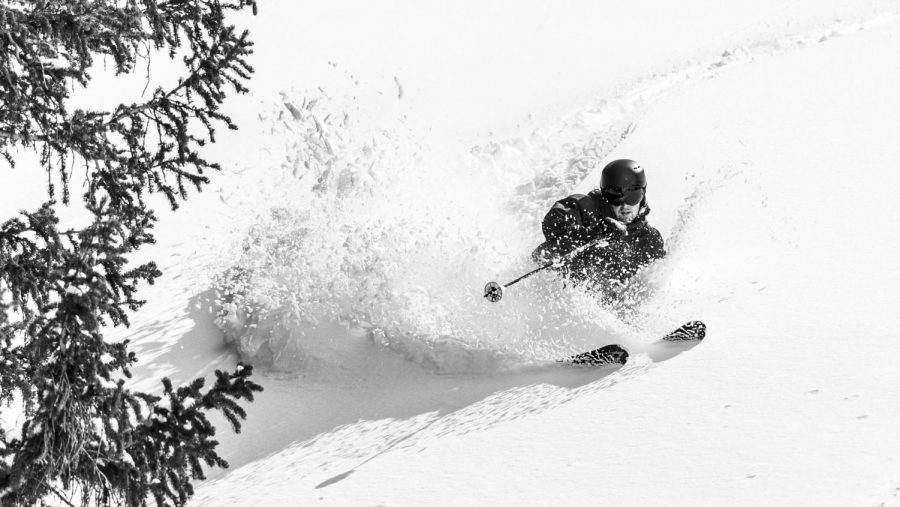This article was originally published in the Outdoors print issue of The Daily Utah Chronicle, originally in stands on September 23, 2024. It has not been updated and some information may be out of date.
Utah has one of the largest skiing economies in the United States, with resorts bringing the state $1.94 billion dollars in nonresident visitor spending during the 2022-23 ski season. That same season boasted 7.1 million ski resort visits, continually surpassing previous years.
These large numbers are not representative of a diverse group. Skiing is incredibly expensive, with daily passes costing up to $300 and season tickets in the thousands. Snow sports are inaccessible.
Although Salt Lake City has an expansive skiing community, exclusion often defines this comradery. Everyone deserves the ability to enjoy recreation within our beautiful landscapes. We must eliminate the elitism present in outdoor snow sports by ending the commodification and corporatization of nature.
Accessibility Is Possible
Many resort patrons would argue that snow sports cannot be made affordable. Resorts are expansive and often include amenities such as hotel rooms and restaurants. Lifts are costly to own and operate. Additionally, homes in ski resort areas are some of the most expensive in the state.
Regardless of the impressive scope of the sport, it is not necessary to make it inaccessible. According to a cost breakdown done by Maison Sport, American snow sports prices are so high that traveling to Europe can save up to $1,000 on skiing, thanks to the country’s cheaper lift tickets.
Additionally, snow sports used to be far more affordable than they are today. At Alta Ski Resort, a single lift ticket in peak season costs $184. Forty-five years ago, this same ticket would have only been about $8. When adjusting for inflation, $8 in the year 1979 is about $34.69 in today’s currency. The price of lift tickets has risen to over 22 times what it used to be, which is disproportional to inflation.
Climate Change and Snow Sports
Part of the reason resort tickets are more expensive is due to climate change. It is not difficult to guess that the snow sports business is weather-based. Although some resorts have summer activities, they are limited and bring in significantly less traffic than their main seasonal attractions.
A large business issue lies here. Resorts want to avoid their money being limited by fluctuations in weather as much as possible. As climate change has worsened with time, fluctuations in Utah winter weather have become increasingly extreme, unpredictable and frequent.
This gives resorts a need to incentivize the purchase of seasonal passes over the purchase of day passes. They have achieved this by advertising the season passes as a better deal. By raising the price of day passes as much as possible, they ensure profit regardless of increasingly unreliable snowfall.
Accessibility Efforts on Campus
The Daily Utah Chronicle spoke with Aidan Larsen, vice president of Utah Freeskier Society, to gain more insight on accessibility within winter sports.
“The purpose of the Freeskier Society is to help strengthen the ski community at the University of Utah and to help make skiing more accessible for students,” Larsen said.
“I feel like local resorts do have a duty to make their lifts monetarily accessible to all, but a lot of the time that doesn’t actually occur. Especially now with these large companies buying so many of our favorite mountains, prices seem to go up every year,” Larsen said.
The majority of ski resorts in the U.S. are privately owned by large corporations. Vail Resorts and Alterra Mountain Company own nearly 50% of the North American ski market. These Colorado-based corporations own multiple ski resorts in Utah, including Deer Valley, Solitude, Park City and Canyons.
In contrast, most ski resorts in Europe are state-owned. This leads to more money remaining in local economies and an increase in competition, leading to lower prices.
“Overall, these sports have a spirit of elitism depending on where you ski or ride,” Larsen said. “Many resorts are becoming so touristy because of the Epic and Ikon pass that the elitism is quite obvious there.”
Epic and Ikon season passes allow resort patrons to get multiple ski days at a wide variety of resorts. These passes have received criticism for oversaturating ski resorts and incentivizing customers away from locally owned resorts and businesses.
“You really have to search around to find a true ‘local’ resort that has reasonable prices,” Larsen said.
Despite these issues, Larsen remains positive about the local ski scene.
“I do believe skiing and snowboarding are inclusive sports because anyone with the proper gear can enjoy either one,” he said. “It is a sport that people can enjoy at any skill level and age.”
Utah Freeskier Society offers solutions to the high costs of Utah snow sports such as discounted passes, carpool group chats and gear swaps. When the community works together accessibility increases.



